Being a good swim parent to your swimmer isn’t difficult, even though you might feel as though you’re not measuring up. The measure of a good swim parent isn’t how well put together they might look.
Because appearances can be deceiving.
Instead, being a good swim parent requires listening and quiet support more than fanatic cheering. Don’t get us wrong, you can cheer as much as you like! But it’s more than just that.
Related article: 8 Things Every Swim Parent Should Know
Want to be a good swim parent? These 6 suggestions can help get you started. 🙂
Disclosure: This post may contain affiliate links, meaning we earn a small commission at no cost to you if you purchase something through one of our links. As an Amazon Associate, we earn from qualifying purchases. Please check out our disclosure page for more information.

Give Encouragement
Everyone needs words of encouragement. No matter how old we are, a little bit of encouragement goes a long way. You as an adult aren’t exempt from it and neither is your child
Think about the times a supervisor supported you on a project or gave you helpful feedback. Although you probably didn’t need it, it still helped to have that reinforcement on the project.
A good swim parent offers encouragement to their swimmer(s) instead of putting them down. It’s not to say that you can’t push and challenge your child within the sport. But you should still offer your support along the way.
When your child first starts swimming, don’t belittle them for being the last one out of the water or the slowest in the pool. It can set up your child to hate the sport and want nothing to do with it.
Related article: 9 Words Swim Parents Should Know
You don’t have to sugarcoat everything for your swimmer. But you can encourage them by pointing out how they’ve grown in the sport. Or how much time they’ve dropped. Give them courage and increase their confidence with your encouragement.
And much like everyone needs encouragement, they also need support.
It can also be as simple as supporting and encouraging their desire to start swimming. It’s hard to take that first step and just as challenging to continue moving forward. Especially when they don’t have the support of those most important to them.

Don’t Be Overbearing
Swim parents walk a fine line between being overbearing and being involved just the right amount. Finding that sort of balance is something that turns a good swim parent into an even better swim parent.
It’s not easy though. And we’ll blanket this with a disclaimer. Every child is different. What’s overbearing to one child might not be overbearing to another.
Overbearing parents affect not just their child, but other swimmers on the team. If you’re the parent that has to sit in on every practice and constantly talk to the coach about every little thing, you’re stressing the heck out of other swimmers.
And probably your child, too.
And if you as a swim parent know more about your swimmer’s competition than your swimmer does, it’s probably time to step back a bit.
Good swim parents know that swimming has an off switch. They don’t bring it up in every conversation and they don’t hound their child with questions or facts about everyone else.
It’s a healthy habit for swim parents and swimmers alike!
Can you look up results about other swimmers and compare times? Of course! But just because you know something doesn’t mean you have to share it. If your child wants to know what their competition did in a meet last week, they’ll look it up on their own. 🙂
If you want to be a better swim parent, learn to let go. Swimming teaches independence and self-confidence. Let them learn on their own without you trying to hold their hand or show the way.
Don’t Be The Coach
How many years of coaching experience do you have? Were you a previous competitive swimmer? And do you know the mechanics of stroke work and the legalities of swimming?
Most parents will answer ‘no’ to all these questions.
And that’s okay. Now you get to learn alongside your child and learn something new along the way.
Coaches usually have years of experience and extensive backgrounds with the sport. Are they perfect? Heck no. You’ll have good and bad coaches. Just as you’ll have good and bad managers.
That said, if you want to be a good swim parent, stop trying to be the coach.
Telling your child to swing their arms faster, kick a different way, or fix their stroke isn’t your job. In some cases, you might tell them something incorrectly.
And we’ll be honest. Swimmers try out different strokes, kicks, and starts all on their own. They see what works for one swimmer and want to try it for themselves. It might work, it might not. But that’s for the coach and the swimmer to determine.
This will sting some, but here’s the hard truth.
Your job as a swim parent is to provide encouragement, support, transportation, funds, and cheering. Your job isn’t to give advice or coaching to your child. Or another swimmer.
Can you ask the coach a question? Of course! If you have concerns or questions about your swimmer, by all means, ask away. That’s what they’re there for. Just don’t be overbearing about it 😉
Actively Listen
Truly listen to what your child and their coach and/or teammates say.
Have you ever been in a situation where someone comes to you with a question or concern and you think you already know the answer?
We’re all 100% guilty of this. It’s human nature to passively listen and assume you know the answer. We do this at work. Our supervisors do this to us. And you probably do it to your family, too.
Learning how to actively listen won’t just make you a better swim parent. It’ll also make you a better person.
Because sometimes people aren’t looking for an answer or a solution. They just want to voice their concerns or frustrations and know that they were heard.
The same thing goes if a teammate or coach approaches you and tells you something negative about your swimmer. They’re acting out at practice or saying negative, derogatory things.
Related article: New Year’s Resolutions for Swim Parents
It sucks to hear someone say that about your child. And the gut instinct is to deny it. Because surely it’s not your child. But would it hurt to actively listen and dig a bit deeper? See if there’s some truth to the claims?
No one is perfect and we all make mistakes.
Relax
You’ve got this, just relax. Being a good swim parent takes some effort but don’t stress about being perfect. Even good swim parents have room to grow.
Probably the best advice we can give you is to just relax.
Too many parents stress and overthink as they try to be the best swim parent. They fret over how they can support their child when truly, just showing up and being there is all a swimmer wants.
The biggest concern you should have is if your child is safe, happy, and enjoying their sport.
Let the coach do their thing and let your swimmer do their thing. As a swim parent, you’re there in the background.
Here’s a secret for you.
If you want to be the best swim parent, talk to your swimmer. Ask them about the things that you do that they like or don’t like. They might hate that you hover around them at meets and constantly talk about swimming. But they might like you cheering them on from the sidelines.
Once you know what your child likes or doesn’t like, respect their answer. You can always compromise if an ask is unreasonable, but you can show your support by listening. It’s that simple! 🙂
In Closing
Swimming, surprisingly, is about balance. Maybe not in the same sense as gymnastics, but great swimmers have great balance.
Both in the water and away from it. They balance their swimming life with the rest of the needs in their life. And that includes finding balance with their parents and the sport.
Good swim parents encourage and support. Better swim parents learn to let go and listen. The best swim parents trust their children and constantly communicate with each other.
If you want to be a good swim parent, learning to listen and communicate is the best first step.
As always, to happy swimming!
Chevron
Bonus Content
Things You Learn as a New Swim Parent: It’s your child’s first year of swimming and you’re feeling lost. Welcome to being a new swim parent! Here are 16 things you’ll learn as a new swim parent.
How to Make Your Swimmer’s Practice a Success: Success at swim practice isn’t determined by talent. Rather, it comes from these extra actions that swimmers put into making their practice successful.

Want to Improve at the Pool?
Join swimmers and swim parents to receive my free newsletter and receive a free Swimming Glossary e-book as a thanks!
Every month you’ll receive tips and coaching to help you find success at the pool.